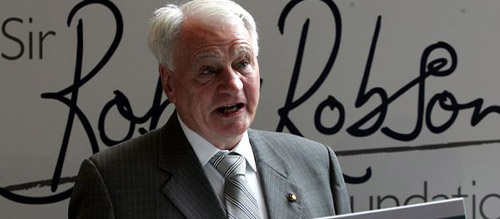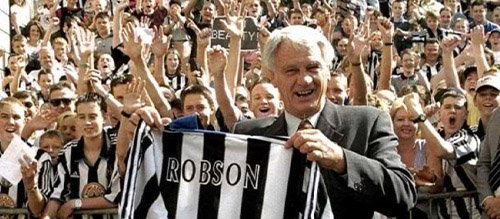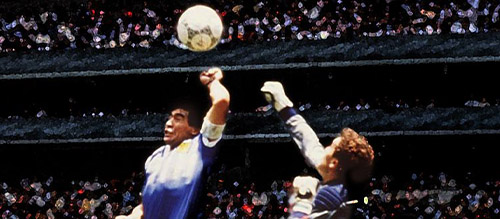7 Moments from ‘Bobby Robson: More Than A Manager’ That Will Give You Chills
3. The Sir Bobby Robson Foundation
Bobby Robson: More Than A Manager is very upfront in underlining Sir Bobby’s extraordinary life achievements with the fact that he battled ill health for a significant portion of his career.
According to the manager’s surgeon, he fully expected Robson’s football career to end whilst he was still managing FC Porto, at whom he developed a malignant melanoma in his head. It’s feasible that this could have become reality, as the film recalls the achingly emotional moment when Sir Bobby apparently wept after seeing his face for the first time following the extremely invasive surgery he had to remove the tumour.
Of course, we know this wasn’t the case as he managed to stick around the game for another 8 years, but to quote the bittersweet sentiment often told by many a football fan, Sir Bobby didn’t lose his battle with cancer, he won 4-1.
It was in 2007 that he had his fifth cancer diagnosis which was, sadly, terminal.
As this article will reiterate many more times throughout, it was not in Robson’s nature to give up in the face of adversity; he faced his problems head-on and managed to make something positive out of it, in the case of his health battles managing to create The Sir Bobby Robson Foundation.
To say he took something positive out of a bad situation is not an empty platitude or a shallow statement. Despite the little time he had left with no doubt painful days ahead, he selflessly used his position and influence in life to save as many other lives as possible. The Foundation these days doesn’t seem to draw as much press interest compared to when it was first founded, but this merely demonstrates its success with it being a fully integrated part of the North-East.
The documentary still manages to instill a sense of wonder in the audience at the realisation of how far the Foundation has come and what it has achieved: for example The Sir Bobby Robson Cancer Trials Research Centre in the Freeman Hospital in Newcastle (the Foundation’s first primary goal) is now a world-leading centre in Cancer Research.
This is what a legacy looks like.
4. Newcastle United Fires Sir Bobby Robson
Can anyone to this day accurately describe the enormity of Bobby Robson, the legendary England Manager, being signed on to manage Newcastle United back in 1999?
Even for those who didn’t support the club, there is an unmistakable pang of sentimentality, with the arrangement very much being an act of coming home for Robson.
As a lad from Country Durham, Newcastle was the team he dreamt of playing for since he was a boy.
Fast-forward to 2004, and the whole of England (and probably much of the international football community) were dumbfounded by the news that Sir Bobby Robson had been sacked by Newcastle United.
In the five years he was there, the team reached the status of one of the Premier League’s “Top 4”, was one of Europe’s top 5 teams and qualified for the UEFA Champions League. Oh the pride!
Without Robson’s appointment, legendary striker Alan Shearer (who still holds the record for the most Premier League goals) probably would have left the club prematurely, but instead stayed on until his retirement in 2006.
After being knocked out of the UEFA Cup Semi-final (2003-04) and an alleged disappointing start to the next Premier League season, Robson was let go by the club’s chairman, Freddy Shepherd. There were also reports of general discontent and arguments in the changing room – this was one of many reasons players of the era got the reputation for lacking respect towards the clubs they played for and the cities they played in.
Apart from in the opinion of the chairman himself, the general consensus of the documentary is that this was the wrong decision.
The way it’s presented in the film, the choice to sack the great man was one that screamed of a lack of gratitude, and even induced a sense of shame, especially in the light of the fact that he was dogged with such poor health afterwards.
Newcastle United have never again reached the dizzying heights it did under Sir Bobby’s leadership, with the team being relegated to the Championship twice in ten years. A tongue in cheek metaphor for divine punishment wouldn’t go to amiss, especially when really considering the club’s indisputably shoddy treatment of the man.
5. The Hand of God
With no insult intended towards Sir Bobby Robson, the part of the documentary that covers his time as England Manager feels eerily similar to football management parody film Mike Bassett:England Manager.
Much like the fictitious Bassett, Sir Bobby Robson had an incredibly rocky start to this particular management gig. The England squad failed to qualify for the 1984 European Championships, which was followed with a less than fantastic start to the 1986 World Cup in Mexico. Images of tabloid campaigns to get rid of Robson (with badges to boot), and footage of furious and screaming fans, was genuinely shocking and upsetting.
It is therefore glorious to see the fruits of Robson’s pro-active and positive approach in the ’86 World Cup – changing up his tactics and swapping players’ positions before the end of the first round, causing the squad to then fly through to the quarter-finals. As history tells us, disaster was waiting just around the corner nonetheless – this time in the shape of a 5 foot 5 Argentinian.
It would be quite the understatement to say that the quarter-final of the 1986 World Cup between Argentina and England had a tense atmosphere. To this day, the two nations do not enjoy the easiest of relationships, but this match was a mere four years after the Falklands War.
The score sat at 0-0 by the end of the first half, but in the 51st minute renowned footballer Diego Maradona scored the first goal of the match with a “hand-ball”.
As set out in the laws of the game, the goal should have been disallowed and Maradona penalised for the use of this illegal move – but as it officially stands, the referee didn’t have a clear view of the incident and so the goal stood.
Argentina went on to win the match 2-1, knocking England out of the tournament and eventually becoming the victors of the 1986 World Cup.
“He was raging after that game… like I had never seen him before.”
Of all the footage and interviews of Sir Bobby used throughout the film, in all of his appearances he is evidently gregarious or at least polite; he’s known as the game’s last true gentleman for a reason.
His moments of shortness and frustration throughout the documentary come nowhere close to the sheer incredulity that radiates off him after this now infamous match.
The reason why this moment strikes such a chord is because this moment of anger shows Bobby Robson as the highly principled man that he was. This wasn’t merely being a sore loser, nor did he take the opportunity to bad-mouth a nation we had previously been at war with, but this was a man genuinely flabbergasted (and possibly even hurt) by a player’s dishonesty and lack of remorse.
“It wasn’t the Hand of God, it was the hand of a rascal.”
This is a man who understands the importance of sport in terms of bringing together the worldwide community, and his reaction here seemed correct if not just.
Maradona has confessed to the hand-ball in later years, but rationally points out it can’t be undone and is now a part of history. Unfortunately, the Hand of God continues to be a source of animosity and disappointment between two nations, each of which are in dire need of healing their connections with one another.





Hello Katie. Thank you for writing this. I enjoyed reading it.
I’m very lucky to look after PR for the Sir Bobby Robson Foundation (and have done since day one). And I can tell you from my own experience of him that Sir Bobby was every bit as special as this wonderful documentary shows him to be.
I think it’s important to note that More Than A Manager was created with the approval and input of Sir Bobby’s family – and, at the filmmakers’ suggestion, that the film helps raise money for the Sir Bobby Robson Foundation by donating a percentage of its profits.
Sir Bobby set up his cancer Foundation as fund within the Newcastle upon Tyne NHS Hospitals Charity in 2008. This means we don’t have professional fundraisers to organise events or co-ordinate volunteers. Despite this, more than £14m has been donated or raised by members of the general public to find more effective ways to detect and treat cancer. Sir Bobby called it his, “last and greatest team.”
The Sir Bobby Robson Foundation works within the NHS and in partnership with other organisations and charities and, while the great man may no longer be with us, his legacy continues to grow.
Support remains as strong as ever – a phrase Sir Bobby was very fond of using seems fitting here, “I’d like to thank them for their faithfulness” – and (I promise!) there is still media interest in our work.
Mark Robson, Sir Bobby’s youngest son, was interviewed on BBC 5 Live last week and we have a wonderful fundraiser who, sadly, has stage IV bowel cancer, being interviewed on the BBC World Service on Saturday morning.
Thanks again for writing this. And you can find out more about the work Sir Bobby’s charity here: http://sirbobbyrobsonfoundation.org.uk/
Oh wow Liz, I’m very happy and proud that you enjoyed my article, but the film itself is so powerful and a joy to watch. I still must confess that I am humbled that you found it and enjoyed my writing.
This article came straight from my heart as I am very much a Newcastle United Fan and work as part of the NHS in the North East, so I know the good work that the Foundation does.
I had no idea that contributions from this documentary went to the Sir Bobby Foundation, so I do hope that my article will help to draw in more audiences (especially as it a genuine “Must See”)
I hope for every success in the Foundation’s future and that they continue to be a part of the fabric of healthcare in the North East.
Thank you again for your comment and for sharing more information on the Foundation for our readers.
Thanks Katie. Yes, a proportion of the money made from the film supports our work – at the filmmakers suggestion. Sir Bobby would have appreciated that. Thanks again, Liz.